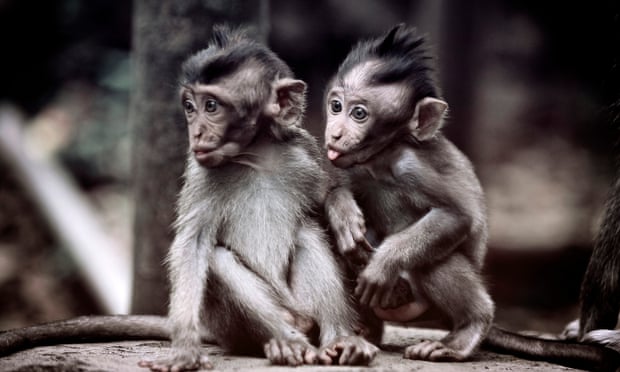 )
)
Genetically modified (GM) monkeys that develop symptoms of autism have been created to help scientists discover treatments for the condition.
The macaques carry a genetic fault that causes a rare disorder in humans called MeCP2 duplication syndrome. This produces a wide range of medical conditions, some of which mirror those seen in autism, such as difficulties with social interactions.
Researchers say groups of the GM monkeys could be used to identify brain circuits involved in common autistic behaviours and to test new treatments designed to alleviate the symptoms.
Because the monkeys pass the genetic defects on to their offspring, scientists can breed large populations of the animals for medical research. A group of 200 monkeys has been established at the scientists’ lab in China.
The research, described in the journal Nature, paves the way for more varieties of GM monkeys that develop different mental and psychiatric problems which are almost impossible to study in other animals.
“The first cohort of transgenic monkeys shows very similar behaviour to human autism, including increased anxiety, but most importantly, defects in social interactions,” said Zilong Qiu who led the research at the Institute of Neuroscience in Shanghai.
“We are currently carrying out brain imaging studies and trying to identify the deficiency in brain circuits that is responsible for autism-like behaviour,” he added.
Qiu said that if his team can work out which networks of brain cells are involved in autism symptoms, they will start investigating treatments that correct their behaviour. Tests could range from electrical stimulation directly into the brain, which some Parkinson’s disease patients have administered, to magnetic stimulation through the skull, and ultimately gene therapy.
The use of monkeys in medical research is controversial, but Qiu said the animals were important for studying conditions that affect the human brain. Scientists already use mice to study autism, but the rodents have such small brains, they cannot be used to look at many of the more complex problems that affect humans.
Mu-ming Poo, director of the Institute of Neuroscience, said that while GM monkeys will not replace mice in research, they will overcome some of the shortcomings researchers face. Many attempts to study human brain disorders in mice fail because their brains are so different, he said.
Kevin Mitchell, a geneticist at Trinity College Dublin, said the modified macaques could have many advantages over mice. While mice are used because they are relatively easy to house, have large litters, and grow quickly, the animals are of limited use in trying to understand human diseases. “This is especially true for psychiatric disorders, as mice obviously do not have the rich, complex and sophisticated behaviours that humans display, and as many of the symptoms of psychiatric disorders affect high-level cognitive functions and faculties,” he said. The much slower development of human brains may in itself make people more vulnerable to brain disorders.
Anthony Chan, a researcher at Emory University in Atlanta, Georgia, who created GM monkeys with Huntington’s disease, said the latest study proved how advances in genetics were transforming medical research. “This particular MECP2 duplication model with progressive development of autism-like conditions will be a great resource for studying Autism Spectrum Disorders and the development of early interventions,” he said.
James Cusack, research director at Autistica, a charity that funds work on autism, said: “Developing sophisticated animal models of autism has always represented a significant challenge for scientists. This excellent research has developed a more sophisticated model of autism which may further our understanding of autism, and could eventually lead to the development of more tailored treatments.
“It should always be remembered that people with autism vary in a number of ways, and autism itself is linked to a number of other conditions. With this in mind, developing a single animal model of autism may be difficult to achieve.”
guardian.co.uk © Guardian News & Media Limited 2010
Published via the Guardian News Feed plugin for WordPress.
Genetically modified monkeys created to help scientists study autism











0 comments:
Post a Comment